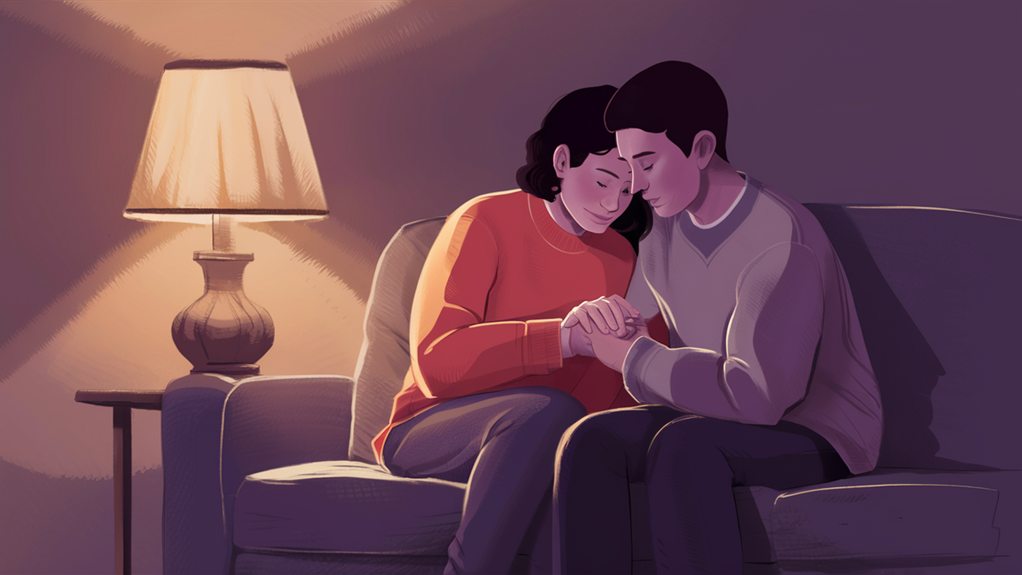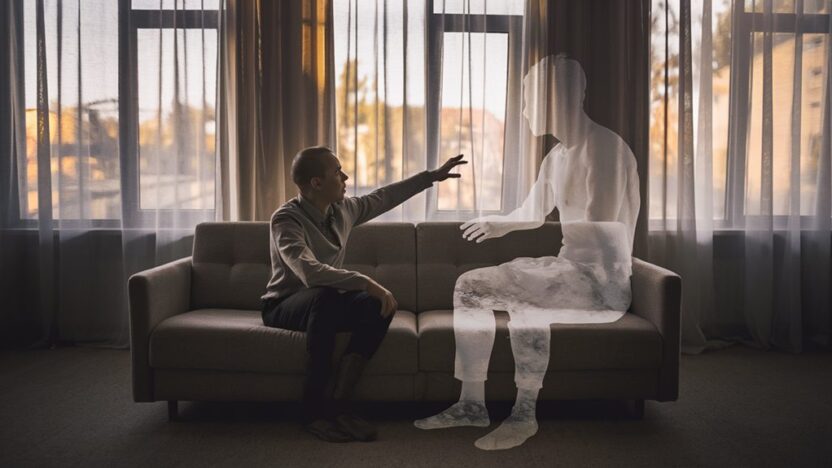Depression can greatly impact your relationship, affecting both emotional connection and daily interactions with your partner. You'll notice changes in communication patterns, physical intimacy, and overall relationship dynamics when depression enters the picture. Supporting a depressed partner requires patience, understanding, and creating a safe space for open dialogue, while also maintaining healthy boundaries for yourself. It's crucial to recognize warning signs, such as withdrawal or changes in daily routines, and encourage professional help when needed. While depression presents real challenges, couples who work together, practice self-care, and maintain trust can strengthen their bond through this journey.
Recognizing Depression in Your Relationship

How does depression silently creep into a relationship? Often, it starts with subtle changes that you mightn't notice right away. Your partner may become withdrawn, less interested in activities they once enjoyed, or struggle to maintain their usual energy levels.
These signs of depression and relationship issues can be easy to miss at first, especially since depression can lead to a sense of hopelessness that permeates daily life, impacting both partners. Understanding depression's impact on relationships is essential for recognizing these shifts.
You'll likely notice changes in how you both communicate, as depression affects relationships in profound ways. Your once-chatty partner might become quiet and distant, or they might react more sensitively to everyday conversations.
Communication in relationships with depression often becomes strained, with one partner feeling overwhelmed while the other feels helpless or confused.
Watch for warning signs like changes in sleep patterns, eating habits, or daily routines. Your partner might struggle to make decisions, even about simple things, or they might express feelings of worthlessness and hopelessness.
Physical intimacy might decrease, and they may withdraw from social activities you used to enjoy together. If you notice these patterns emerging, it's important to approach the situation with patience and understanding, as depression requires professional help and support from loved ones.
Impact on Communication
Depression's presence in a relationship dramatically alters the way partners interact with each other. When you're dealing with depression, whether it's you or your partner who's affected, you'll notice significant changes in your daily conversations and emotional exchanges. Simple discussions might become overwhelming, and you'll find that expressing feelings becomes increasingly difficult, as depression creates a thick fog that clouds understanding between partners.
Additionally, the impact of anxiety can intertwine with depression, further complicating communication as both conditions can lead to increased misunderstandings and emotional distance. Understanding Anxiety's Impact
You might notice that your usual communication patterns have shifted, with one partner becoming more withdrawn or irritable during conversations. The depressed partner may struggle to maintain eye contact, respond with shorter answers, or avoid deep discussions altogether. Even when you're trying your best to connect, depression can make your words feel heavy and your thoughts harder to organize.
Your non-verbal communication often changes too, with less physical affection, fewer shared smiles, and reduced emotional intimacy. These changes can leave both partners feeling disconnected and frustrated, especially when you can't seem to bridge the growing gap between you.
Understanding these communication challenges is essential for developing strategies to maintain connection during difficult times.
Supporting Your Depressed Partner

Supporting a partner through depression requires patience, understanding, and a delicate balance of compassion and boundaries. When you're helping someone you love navigate through depression, it's important to remember that you can't "fix" them, but you can provide meaningful support that makes a difference.
Engaging in group therapy can also be beneficial, as it offers an opportunity for your partner to connect with others who share similar experiences and gain insights from diverse perspectives, ultimately fostering a sense of community and understanding the benefits of group therapy.
You'll need to develop specific strategies to help your partner while taking care of yourself. Here are key ways to provide support effectively:
- Listen without judgment, offering a safe space for your partner to express their feelings and thoughts
- Encourage professional help when needed, but avoid pushing too hard or making demands
- Help with daily tasks when depression makes them overwhelming, such as cooking or cleaning
- Learn about depression through reliable sources to better understand what your partner is experiencing
- Practice self-care and set healthy boundaries to maintain your own emotional well-being
Remember that supporting someone with depression is a marathon, not a sprint.
Don't hesitate to reach out for help yourself, whether through counseling or support groups for partners of people with depression. Your mental health matters too, and you'll be better equipped to help your partner when you're taking care of yourself.
Self-Care for Both Partners
When managing depression within a relationship, maintaining self-care practices for both partners becomes essential for long-term stability and healing. As you support each other through difficult times, it's vital to establish healthy boundaries and routines that protect your mental well-being.
Regular exercise can be a powerful tool in this process, as it has been shown to alleviate symptoms of stress and anxiety the stress-relieving power of exercise.
For the partner with depression, you'll want to focus on basic self-care activities, like maintaining regular sleep patterns, eating nutritious meals, and getting moderate exercise.
Don't forget to keep up with your therapy appointments and medication schedule, if applicable, as these form the foundation of your recovery process.
For the supporting partner, you'll need to create space for your own emotional needs while helping your loved one. Make time for activities you enjoy, maintain connections with friends and family, and don't hesitate to seek counseling if you're feeling overwhelmed.
Remember, you can't pour from an empty cup, so taking care of yourself isn't selfish—it's necessary.
Both partners should practice mindfulness, engage in stress-reducing activities together, and communicate openly about their needs and boundaries.
When you're both committed to self-care, you'll create a stronger foundation for healing and growth.
When to Seek Professional Help

While self-care practices can help manage depression in relationships, recognizing the right time to seek professional help marks a significant step toward healing.
It's important to understand that untreated depression can escalate and lead to severe consequences, including thoughts of self-harm or suicidal ideation, which is why it's essential to identify when additional support is needed effective suicide prevention.
You'll want to watch for signs that indicate your relationship needs additional support beyond what you can manage on your own.
Here are key indicators that it's time to consult a mental health professional:
- Your relationship conflicts consistently center around depression-related issues, such as withdrawal or emotional numbness
- You've noticed significant changes in your partner's eating, sleeping, or daily routines that have lasted more than two weeks
- Communication between you and your partner has broken down, leading to frequent misunderstandings or arguments
- Either you or your partner has expressed thoughts of self-harm or hopelessness
- Your usual coping strategies and self-care techniques aren't providing relief anymore
Don't hesitate to reach out to a couples therapist or counselor who specializes in depression.
They'll provide you with professional guidance, tools, and strategies to help both partners navigate this challenging time.
Building Trust Through Hard Times
Trust becomes especially fragile when depression affects a relationship, yet it's during these challenging times that maintaining trust matters most. When you're dealing with depression, or supporting someone who is, you'll need to focus on open communication and consistent support to keep trust strong.
Research shows that certain dietary choices can impact mood and cognitive function, which may help support your emotional well-being during these times the link between diet and mental health.
You can build trust by following through on your commitments, even small ones, and being honest about your limitations. If you're the partner with depression, let your loved one know when you're having difficult days, and if you're the supporting partner, make sure you're acknowledging their efforts to get better.
Remember, trust grows stronger when both partners show up consistently, even if it's just to sit together quietly or share a simple meal.
Create a safe space where you can both express fears and concerns without judgment, and don't forget to celebrate small victories together.
When your partner opens up about their struggles, respond with empathy and validation rather than trying to fix everything. This approach helps maintain emotional safety, which is essential for trust to flourish during challenging periods in your relationship.
Maintaining Intimacy During Depression

Depression can affect intimacy in three distinct ways: emotional connection, physical closeness, and sexual desire. When you're dealing with depression, you might find yourself pulling away from your partner, even when you don't want to. This emotional distance can create barriers that seem impossible to overcome, but there are ways to maintain and rebuild intimacy during these challenging times.
Engaging in regular exercise can be beneficial, as it helps boost mood and reduce anxiety, making it easier to connect with your partner. Consider incorporating activities that you can do together, as exercise can elevate your mood and foster a sense of togetherness.
To nurture intimacy while managing depression, consider these essential strategies:
- Start with small gestures of affection, like holding hands or sharing a brief hug
- Set aside dedicated time for connection, even if it's just sitting together quietly
- Communicate openly about your feelings and needs, even when it's difficult
- Practice non-sexual touching to maintain physical closeness without pressure
- Create new routines that prioritize emotional bonding, like daily check-ins
Remember that you don't need to force physical intimacy when you're not ready. Instead, focus on maintaining emotional connection through honest communication and gentle persistence.
Your partner's understanding and patience, combined with your willingness to stay connected in whatever way feels comfortable, can help preserve intimacy during depressive episodes.



